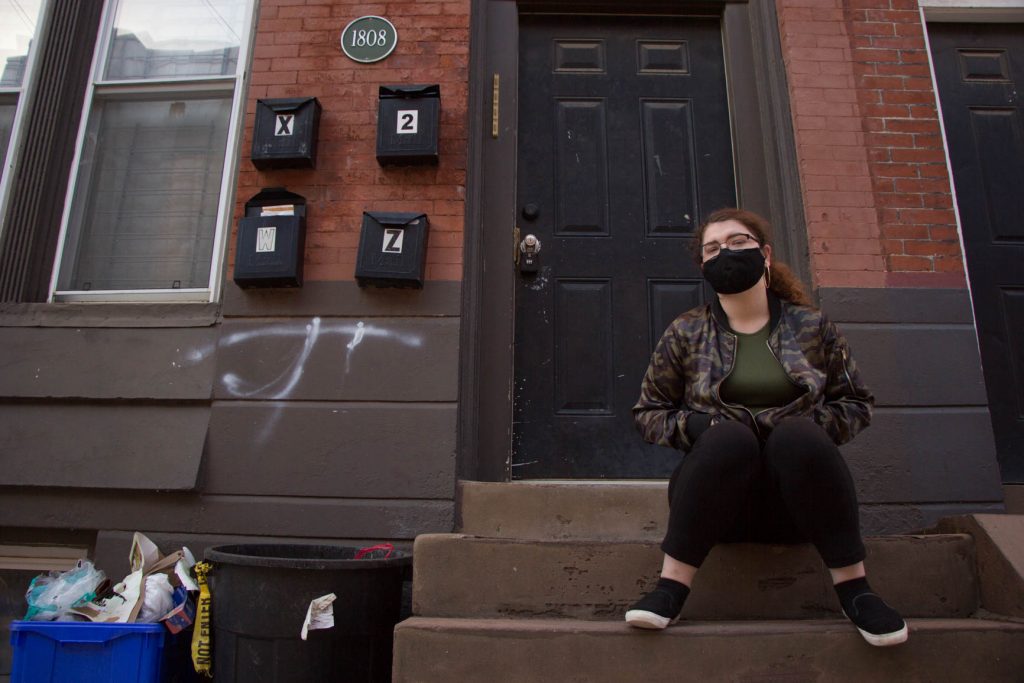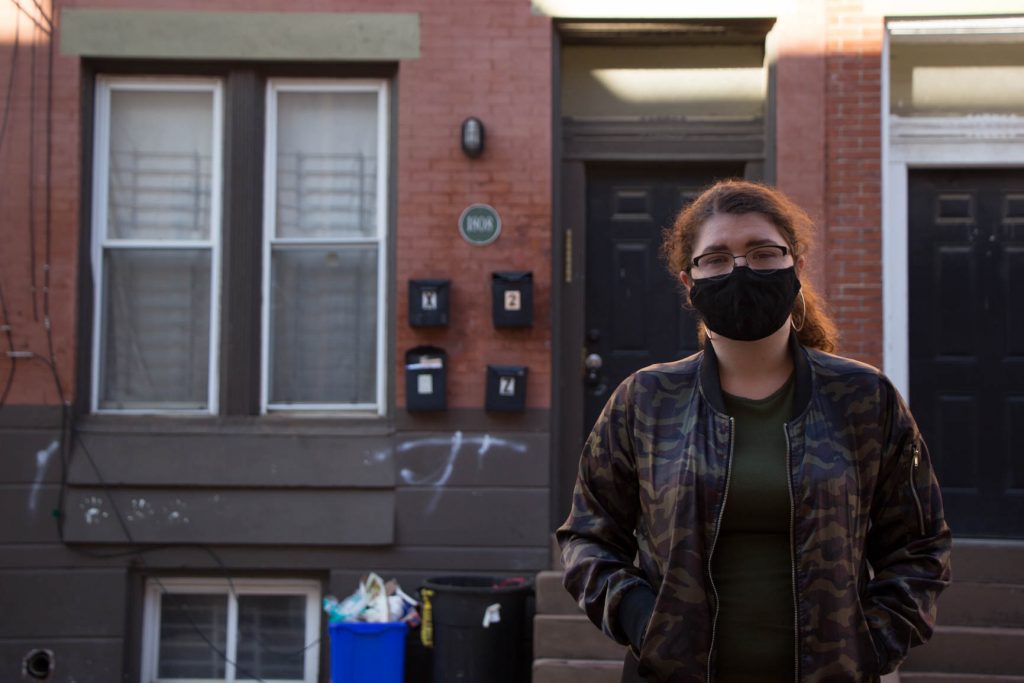
CLOSER TO LOVED ONES
Tori Ruth, a sophomore psychology and classics major, learned to support friends and family during the challenges of the COVID-19 pandemic.

hen Philadelphia recorded its first case of COVID-19 in March and universities across the city closed their campuses, Tori Ruth was suddenly alone.
Ruth’s boyfriend and their roommate headed home to be with family, but a food service job in Center City kept them in their apartment on Montgomery Avenue near Bouvier Street where for months, Ruth “wouldn’t spend time with anyone,” they said.
That continued into the start of this fall, when the COVID-19 pandemic’s impact on their normal campus life created a period of stress and anxiety for Ruth, a sophomore psychology and classics double major. The semester of social distancing made Ruth’s relationships more important for them to maintain and strengthen in the time spent apart from family and friends.
Ruth, a 20-year-old LGBTQ community member from Cherry Hill, New Jersey, has only had one “normal” semester in college so far. In the spring of their freshman year, Temple University closed its campus in March due to the COVID-19 pandemic and Ruth had to quickly move out of 1940 Residence Hall and find an apartment off campus.
In Ruth’s time living alone during the summer, the anxiety they always struggled with worsened and they often felt isolated, wishing for someone nearby to talk to. It was a relief when their roommate returned to Philadelphia in August for the fall semester, especially because Ruth wouldn’t be attending classes in person.
“This pandemic made me figure out that I don’t like being alone,” Ruth said on Nov. 17. “I was kind of going a little stir-crazy.”
In late July, as the fall semester approached, Ruth initially felt disappointed they would not reunite with their peers in the classroom, but Temple’s decision to hold most classes online made them feel safer as COVID-19 cases continued to rise across the nation, Ruth said on Aug. 24, the day classes began and the United States had counted 5.7 million COVID-19 cases.
Ruth originally had a Greek language class scheduled to be held in person, but it was switched online shortly before the fall semester started. Ruth had signed up for the rest of their classes to be online and didn’t plan to go to Main Campus unless needed.
Having their roommate around, who is a sophomore biology major, helped them feel less stressed about the changes to campus life because Ruth can talk to them without finding time for a phone call, something they had to arrange with their boyfriend and family members while living alone.
“Even now, sometimes we don’t even have to really talk to each other to understand what the other person’s trying to get at or what they need or something,” Ruth said on Nov. 17. “I feel like she’s a shoulder I can lean on if I need it, and vice versa.”
As September approached, Ruth was overwhelmed, struggling to focus during their Zoom classes and keep track of work for their asynchronous online classes. They tried to get organized and implement effective study habits before their workload picked up.
Much needed good news came in late September when Ruth’s boyfriend, who attends Drexel University, told them he would be returning to Philadelphia, after living away and not seeing Ruth for more than six months.
Previously, he and Ruth had struggled with communication while living apart during the pandemic. If the two fought, one could easily turn off their phone and ignore the other. When Ruth was at work, their boyfriend was in class. But with time, they connected by playing video games together and texting throughout the day.
Now living together, the two worried about COVID-19 safety. For example, Ruth’s boyfriend wouldn’t talk to them when they come home from work until after they showered and changed clothes. But being able to communicate face-to-face about their needs helped their relationship immensely.
“We had to figure out how to do it without being able to sit each other down and talk,” Ruth said on Oct. 6. “That stayed, even when he came back.”
The two began visiting each other’s apartments frequently and talking to their boyfriend helped ease Ruth’s anxiety.
“Having him here kind of gives me some kind of outlet,” Ruth said on Nov. 17. “He doesn’t go to Temple, obviously, but he’s still dealing with how colleges are handling it.”
October brought midterm exams and Ruth lost motivation for online classes, finding them difficult to balance alongside their job, where they worked 25 to 30 hours a week at Shake Shack in Center City.
Every Wednesday, Ruth took classes from 10:30 a.m to 3 p.m., with two 10-minute breaks in between. They often needed to cram classwork into short periods to work as many hours as possible.
“If I miss this shift, that could mean I can’t pay this bill, it’s just stressors like that, that kind of prevented me from being able to fully dive into school sometimes,” Ruth said on Nov. 17.

During October, Ruth also found time to make periodic trips to New Jersey to visit their parents, sometimes buying them lunch. Ruth’s parents have been experiencing homelessness since July after both losing their jobs in March amid layoffs due to the COVID-19 pandemic. They lost their home in Cherry Hill as they couldn’t renew their lease because of debt, Ruth said.
“I know they’re trying to make the best of a bad situation, but it stings,” Ruth said on Nov. 17. “I can’t do anything to help, I barely provide for myself sometimes.”
This situation, while worrisome for Ruth, made them feel closer with their family. Ruth’s older brother, who previously lived with their parents, moved in with Ruth off campus in late October, something Ruth said “is kind of weird, but I don’t mind.”
“My relationship with my parents and my brother has probably strengthened,” Ruth said on Nov. 17. “During quarantine, we kind of had to lean on each other.”
Leading up to the presidential election, Ruth and their boyfriend watched coverage of it “like a hawk,” hoping former Vice President Joe Biden would be elected president.
The COVID-19 pandemic seemed like the peak of four bad years under President Donald Trump for Ruth, they said. With a new president, Ruth hoped the state of the country could start to turn around.
When Biden was declared the winner of the election on Nov. 7, Ruth’s parents and their boyfriend were the first people they called from work.
“My boss was like, screaming and jumping around, it was so funny,” Ruth said on Nov. 8. “It kind of felt like a sigh of relief.”
The day after the election, however, Ruth woke up with chest pain and a sore throat. They thought it was allergies, but as they got sicker during the next two days, they made an appointment at Temple University Student Health Services on Nov. 11 to be tested for COVID-19.
“I’m like running through my head because I’ve seen my parents in the last two weeks, I’ve been with my roommate, I’ve been with my boyfriend,” Ruth said on Nov. 13. “I’m thinking, ‘Okay, what’s gonna happen, how many people did I hurt?’”
Ruth tested negative for COVID-19 on Nov. 13, five days after their symptoms started, alleviating their fears they had potentially infected their mother, who has asthma and a chronic cough, and their father, who has diabetes.
A positive test would have also compromised Ruth’s plans to celebrate their birthday with their boyfriend and cook dinner with their family on Thanksgiving, so everyone in Ruth’s life seemed relieved to spend the holiday together. Ruth hosted Thanksgiving at their apartment and their parents and brother came over to make dinner.
“It almost felt normal, almost like a regular holiday,” Ruth said on Dec. 3. “Knowing that I can at least see my parents get some food for a day, be with them and actually not be alone is great.”
On Dec. 14, Ruth woke up feeling a little nervous, as they would be saying goodbye to their boyfriend who was returning to his New Jersey home for the holidays.
Last time Ruth said goodbye to him, three weeks away ended up becoming six months apart. But, this time, the two knew they could call each other and play video games together to feel connected while he was gone.
Ruth had four exams and a final portfolio due at the end of the semester. Though they weren’t thrilled that they may end up with a B+ in one or two classes as result of their time working and difficulty learning in Zoom classes, they didn’t stress about final exams.
Ruth will still take all online courses in the spring but has scheduled them so they have no classes on either Tuesday or Thursday so they can take breaks from constantly balancing classwork and their job.
Still, Ruth was more focused on getting this semester over with so they can fully prioritize work during winter break.
“It hasn’t been a bad one, it’s just been an interesting one, I wouldn’t call it good either,” Ruth said on Dec. 14.

